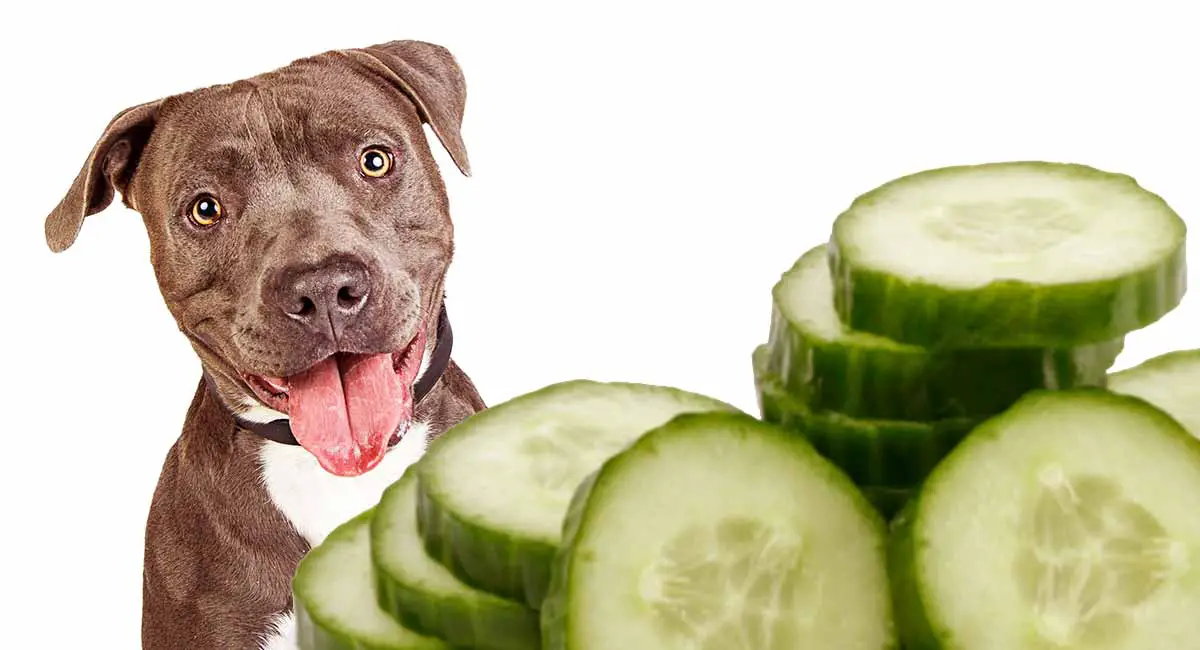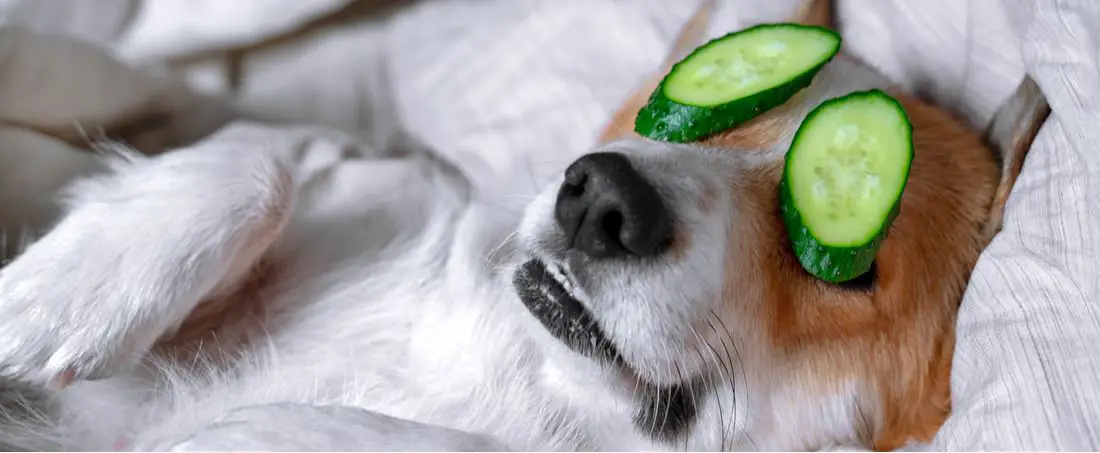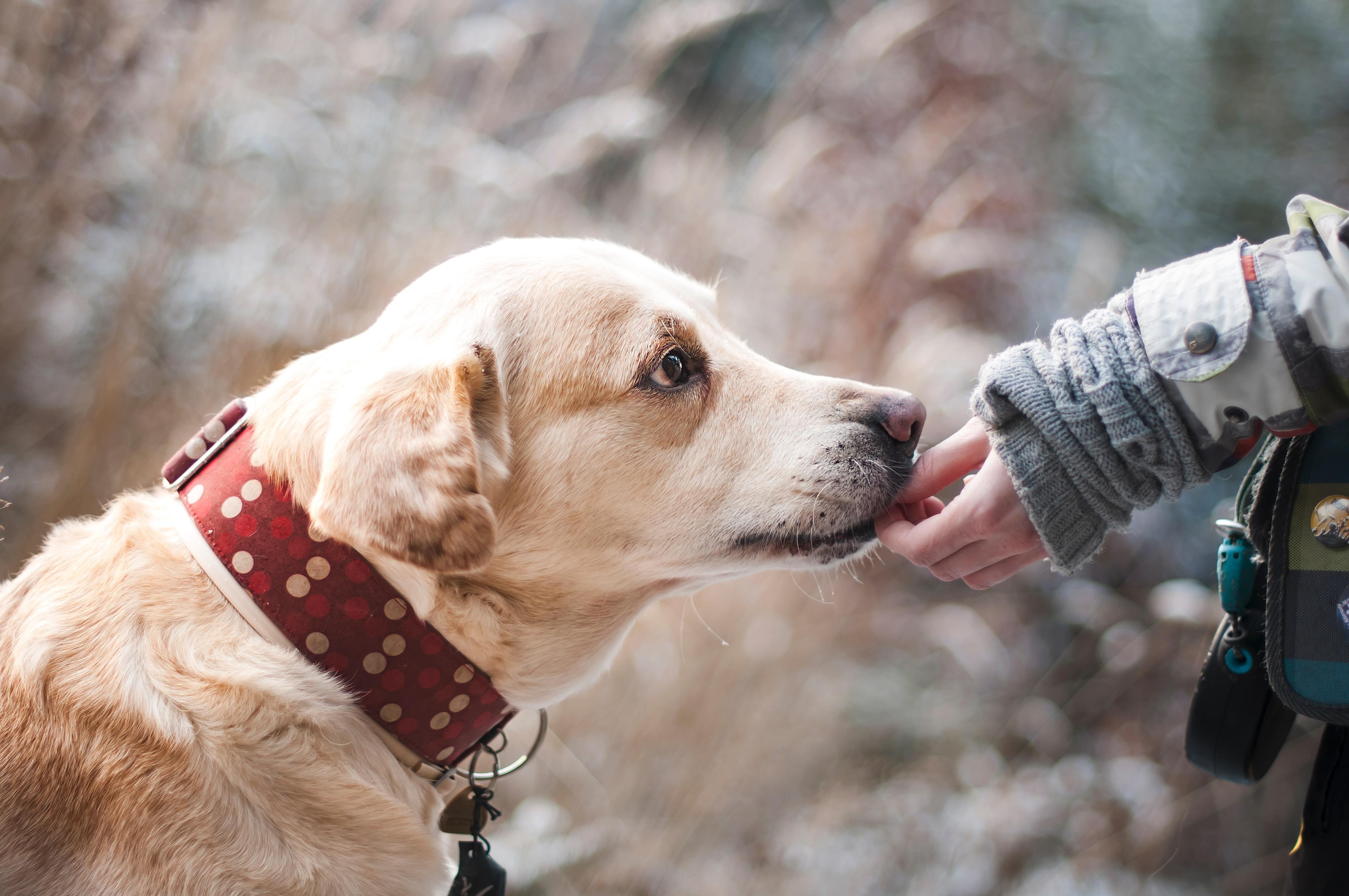Table of Contents
Can Dogs Eat Cucumbers- If Yes, How Much?
People like cucumbers a lot but can dogs eat cucumbers? Whether it’s on a sandwich, in a salad, or used as a dip, when you cut up carrots and cucumbers for a salad, does your dog look at you with those big puppy eyes and make you wonder, “Can dogs eat cucumbers, too?”
You might always give your dog a piece from the end, but you might not know how much they can safely eat. Dogs are omnivores, suggesting they eat both animal and plant foods. Many fruits and veggies are secure for your pets to eat in moderation, while others can hurt them.
The good news is that cucumber is good for dogs as it is for people. Most dogs will like how crunchy and juicy it is. But if you want to give your dog a piece or two, there are a few things to keep in mind. Continue reading to find out!
Cucumber: General overview

People often think of cucumbers as a vegetable, but they are a fruit.
Cucumbers, which have the scientific name Cucumis sativus, are a popular food plant in the gourd family Cucurbitaceae. Most people believe it is a vegetable, but it is a fruit because it grows from flowers and has seeds.
They are dark green and can grow to be more than two feet long. The outside of the fruit may have small “spikes.” They are usually with the other fresh vegetables and may have a thin layer of plastic film. Be sure to take this out before giving it to your dog. A pickle is also a small cucumber that has been stored in brine or vinegar.
Are Cucumbers Safe for Dogs?
Cucumbers are entirely safe for dogs to eat, and many dogs love the crunchy, low-calorie snack they make. A half-cup of cucumber slices has only about 8 calories, while a single medium Milk-Bone biscuit has 40 calories. Cucumbers are also very low in sodium and fat.
When you give dogs cucumbers, they could eat too much or choke on them. Most of the time, giving your dog too many cucumbers won’t hurt it too much. However, giving too much of any food can upset its stomach, especially if it’s something new that your dog has never eaten before.
To keep your dog from choking on food, always cut it down to a size it can handle. This is particularly important for small dogs or dogs that eat quickly. It’s not a good idea to feed your dog a complete cucumber.
The 10 % rule is the right way to figure out how much cucumber to give your dog. Veterinarians say that treats shouldn’t make up more than 10% of your dog’s daily food intake.
The amount of cucumber you give a German Shepherd Dog and a Chihuahua will be very different.
As with any new food item, you must slowly add cucumbers to your dog’s diet and watch for any bad reactions.
Nutrients
Cucumber also contains vitamins B and C, which maintain a healthy immune system, and vitamin K and calcium, which helps keep your dog’s bones stronger. Cucumber also provides nutrients that aid in the wellness of your canine companion. Potassium, manganese, and copper are a few examples. It is also high in fiber which is beneficial to your pup’s digestive tract!
Calories
Cucumber is low in calories, fat, and salt, so it can be used as a healthy reward when training or as an alternative to dog treats if your dog is trying to lose weight. So, a few cucumber slices are fine if your dog is on a low-calorie diet. This is good news for dogs with pancreatitis because you can give them cucumbers without worrying that it will worsen their symptoms.
Cucumber health benefits

- Water: Cucumbers are 95% water, so their hydration properties are excellent.
- Fiber: The peel or rind of a cucumber contains most of the soluble fiber. This means it absorbs water as it passes through the digestive tract. Soluble fiber helps in the passage of food through your dog’s digestive tract and can enhance stool quality.
- Calories: Because of its high water content and low sugar content, this fruit is low in calories, with only 8 calories in a half-cup.
- Vitamin B1 (Thiamine): Controls the metabolism of carbohydrates and energy.
- Vitamin B5 (Pantothenic Acid): This aids in energy production.
- Vitamin B6 (Pyridoxine): This aids in producing red blood cells, nervous system function, hormone regulation, and immunological response.
- Vitamin C: This potent antioxidant seeks for and destroys free-radical chemicals that can harm cells. It also helps the immune system by lowering inflammation, combating some malignancies, and slowing aging.
- Vitamin K: This vitamin is required for blood clotting and coagulation.
- Potassium: This mineral keeps your dog’s kidneys in good working order. It also promotes proper cardiac function, muscular function, and digestive health.
- Calcium, Zinc, and Iron: Cucumbers contain trace levels of these. They help with bone growth and integrity and immune system function.
- Manganese: This micromineral aids in the breakdown of proteins and fatty acids. It also helps in energy production and the upkeep of ligaments and bones.
- Molybdenum: It is a micronutrient that is needed for proper cell activity. It metabolizes carbs and protects the body from copper overload.
Cucumbers have fewer nutrients than some other fruits and vegetables, like broccoli, strawberries, pumpkin, and blueberries, because they are mostly water. But they are still good for your dog in some ways.
How Much Can My Dog Eat?
When giving your dog a new treat, always start with a small amount.
Dogs love to crunch on juicy slices of cucumber. Still, like all treats and snacks, it should be given in moderation, and you should always use the 10 percent rule to figure out how many treats to feed your dog.
Only 10% of a dog’s daily calories should come from treats. This includes fruits and vegetables like cucumber and any other treats they might be getting. So, the serving size will depend on the dog’s size and breed, but a few slices are generally fine.
How to Prepare Cucumber for Your Dog

We’re not kidding when we say that some cats don’t like cucumbers, but most dogs are curious and daring enough to try them if you have them. Most healthy dogs don’t need much help knowing how to eat cucumbers safely. But here are some tips to consider while feeding cucumbers to your dog.
Feed Moderately
There are only 12 calories in one cup of sliced cucumbers that have been peeled, so it’s hard to eat too much of this healthy snack. But don’t feed your dog too many cucumbers or other foods meant for people. Many vets say that treats shouldn’t make up more than 10% of your dog’s daily calories.
Don’t Give Your Dog the Whole Cucumber
Some dogs that eat like hungry wolves might choke on a whole cucumber or a bigger piece. There is also a chance that the bigger pieces will take too long to break up. “There’s always a chance of getting stuck because the dog’s digestive system would take so long to break down the cucumber.” Instead, choose slices or pieces that are smaller and thinner.
Leave out the skin and seeds.
Most stomach upsets and other digestive problems in dogs are caused by the seeds and skin, which are the hardest to digest. So, if your dog has a stomach ache, take out the seeds and peel the skin of the cucumber before giving it to him. Even though most dogs are OK with either the skin or the seeds, it doesn’t hurt to be careful just in case.
Go Raw
Dogs can eat raw cucumbers, and it’s probably safer for them to do so. Cucumbers end up in salads and other foods that might have dressings, oils, and seasonings that are bad for dogs. Be especially careful with artificial sweeteners with xylitol since even small amounts can kill dogs.
When is Cucumber Bad for your Dog?
Your dog may also get sick if he eats cucumbers, so it’s best to ask your vet first.
Few things can go wrong when you give your dog cucumbers, but they can have too much of a good thing. Like many foods for people, giving your dog too much cucumber can upset its stomach. This isn’t a big issue most of the time, and all it is is diarrhea and gas. But if the symptoms don’t go away, you should talk to your vet about what to do.
Some dogs may have trouble digesting cucumber skin, which can also contain pesticides and other harmful chemicals. If the cucumber is fed in big chunks, it could also choke him. Before giving the cucumber to your pet, always wash it to eliminate germs and cut it into thin slices.
It’s also important to remember that cucumber is 95% water, so giving your dog too much of it without giving his usual dog food can cause nutritional problems.
Can an obese Dog eat cucumbers?

Yes! Because it has few calories and lots of water, this fruit is a great choice for a training treat (cut into small pieces) or an afternoon snack if your dog tends to eat too much. Just give your dog small amounts until you know he can handle them. You might also want to talk to your vet about this treat.
Diet and exercise are the best ways to help an overweight dog lose weight. Giving your dog cucumbers may help fulfill their desire for treats without making them fatter.
Can Dogs with diabetes eat cucumbers?
Cucumbers are great for diabetic dogs because they don’t have much sugar, but you should always ask your vet before feeding them to your dog.
Some studies have found cucumbers help animals with diabetes. Starch breaks down in your dog’s body into sugar. But because cucumbers don’t have any starch, they can help control insulin and blood sugar. Isn’t this good news?
So cucumbers are healthy snacks for our dogs and us. If you keep an eye on how much your dog eats and give them only 10% of his diet, they can not only add some good nutrients but also help with problems like obesity and diabetes. They keep them hydrated on sunny days and are a healthy alternative to store-bought treats.
Are there any Dogs who shouldn’t eat cucumbers?
Cucumbers are safe to feed for most dogs, but if your canine companion has a sensitive stomach, cucumbers may not be good for them. Try giving them a modest amount at first, but if it causes stomach upset, stop giving them and seek advice from your veterinarian.
Always consult your regular veterinarian before introducing new foods into your dog’s diet, especially if they are on a special diet.
Can My Dog Eat Pickled Cucumbers?
Pickles’ high salt content and additional additives might cause Hypernatremia. If you’ve ever given your dog a pickle, you may have noticed him spit it out! Pickles do not appeal to our four-legged pals and can also be harmful to canines.
Cucumbers are often pickled in salt, water, and vinegar brine. However, extra additives (such as onion and garlic) are sometimes used to improve flavor, which can be hazardous to canines.
Pickled cucumbers contain more salt than fresh cucumbers. Dogs don’t need salt as much as humans do.
Hypernatremia is a condition caused by eating too much salt. This is when dangerously high quantities of salt accumulate in their system. This might result in vomiting, diarrhea, dehydration, and convulsions, necessitating immediate veterinarian care.
It is better to avoid giving pickled cucumbers to dogs in favor of a healthier fresh variety!
Other Dog-Friendly Fruits and Vegetables
Some fruits and vegetables that dogs like are:
- Apples
- Pineapples
- bananas
- Blueberries
- Carrots
- Green beans
- Mangoes
- Strawberries
- Sweet potatoes
- Tomatoes
- Pumpkin
- Squash
- Broccoli
- Oranges
Remember that the same advice for cucumbers applies to many other fruits and vegetables as well:
- Get rid of things that are hard for your dog to digest.
- Try them out first to ensure they don’t make your dog sick.
- Give them in small amounts.
- Ask your vet before feeding your dog any new foods.
Can Dogs Eat Cucumbers? Final Thoughts
Yes, dogs can eat cucumbers! A few cucumber slices can be a nutritious, low-calorie, low-fat snack for your dog. Remember to feed cucumber in moderation, as with any new food. An upset stomach might result from eating too much at once. Cucumber can be a pleasant treat on a hot day or a healthy workout reward!
To avoid choking, always wash cucumber before feeding it to your dog, then chop it into thin slices.
Pickles, which can contain hazardous compounds, should not be fed to them.
FAQs
1. Can a dog eat cucumber skin?
Yes, dogs can eat the skin of cucumbers. But dogs may have trouble digesting cucumber skin, so cut it into very thin slices if you want to serve it with the skin on. Pesticides and other chemicals can also be on the skin, so you should wash them well before giving them to your pet.
2. Can a dog eat raw cucumbers?
Yes, the best way to give your dog cucumber is raw. Raw cucumbers are safe, healthy, and low in calories. They are also a tasty way for your dog to stay hydrated.
3. How many cucumbers can your dog eat a day?
Your dog should only get 10 percent of its daily calories from treats, such as raw vegetables. Most small dogs should get one or two slides of cucumber every day, while most large dogs can get up to an inch of sliced or chopped cucumber every day. Don’t forget that every dog is different, so you should change this to fit your dog’s needs.
4. Can a dog eat pickled cucumber?
Pickled cucumbers have a lot of salt, making dogs sick and dry out if they eat too many. Some of the things in pickles, like onion or garlic, are very bad for dogs, so it’s best not to give a dog pickles.
5. Does it help with bad breath?
Some people say that cucumber can help if your dog has bad breath, but no scientific evidence supports this. The best way is to talk to your vet, who may suggest regular teeth cleaning or dental treatment at the clinic. They might also suggest dog food that will make their breath smell better.


